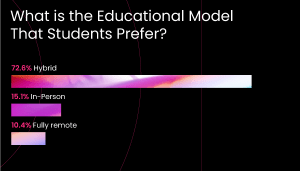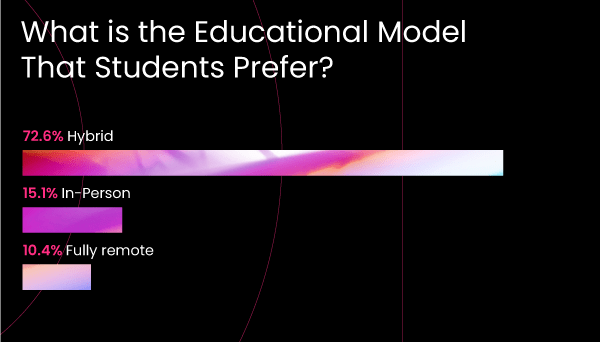

For 68% of Italian students, the perfect training opens up the world of work and connects them to companies. And 72% of students prefer the hybrid educational model.
The data comes from a survey of 1,600 members of the Docsity community by OPIT – The Open Institute of Technology.
OPIT founder Riccardo Ocleppo states: “Students need more practical learning and skills that allow for a faster and more profitable entry into a company.”
Milan, 19 June 2023 – Italian students aged between 18 and 26 prefer educational and training offerings based on the hybrid models and a focus on up-to-date training provided by quality teaching staff. They’re also less likely to believe that the name of a university is enough to guarantee job opportunities upon graduating. These are some of the chief findings to emerge from an OPIT survey of 1,600 students (secondary level and university) who are part of the Docsity community – a platform for sharing documents and interesting content – just a few days before the beginning of final exams.
The results show that students consider job opportunities and connections with companies as the main factors when evaluating study opportunities (68%). Cost is also an important criterion (39.6%), as is the updating of teaching methods and practical aspects of the course to ensure they’re aligned with today’s work environment (33.1%). Furthermore, 21.7% of those surveyed note the quality of the teaching staff as being crucial to helping them absorb the skills they need to succeed as workers in the future. The “name” and reputation of a university of training provider only matters to 13% of those surveyed.
“The data confirms what we had foreseen when we decided to enter the education market,” says OPIT’s founder and director Riccardo Ocleppo. “Involving companies in our programs was a top priority, and their insights were instrumental in designing the modules we created, including what technologies to rely on and the programming languages we work with, for example.”
“By working with companies to design our programs, we’ve found that students both require and prefer a much more hands-on learning experience. This ensures they’re up to date on current technologies, processes, and ways of working when they join a company. So, our goal for our students is that they leave OPIT feeling much more knowledgeable about what employers really need from them.”
As far as learning methods are concerned, students prefer the hybrid model – having the opportunity to participate in face-to-face lessons while retaining the flexibility to access course content online or even via a fully remote model based on their needs. Amongst university students, 72.6% say they prefer the hybrid model, unlike secondary students, who retain a preference for my “physical” styles of teaching.
When secondary students were asked about their choice of university, 46% of boys and girls indicated engineering, computer science, and STEM as their preferred fields. Humanities and communication followed (20.6%), with economics taking the third spot (17.9%).
“Rapid developments in technology and artificial intelligence,” continues Ocleppo, “are creating new job opportunities for STEM graduates, which current students clearly understand. Specific skills are becoming increasingly important as enterprises move more and more to make the most out of the changes brought by AI. Yet, the shortage of tech workers is expected to grow even faster in the coming years. Despite the concern that the wave of AI-inspired technologies is creating, there is no doubt there will be demand for certain types of professionals with specific technical skills.”
OPIT’s data also indicates a widespread trend toward the continuation of studies beyond initial certification, belying the more pessimistic readings on the growth of the NEET (Not in Education, Employment, or Training) phenomenon. Enrolling in a degree course remains both the safest and preferred choice for the majority of secondary school students – 82% confirmed their intention to continue their studies at the university level. A further 8.3% are undecided about university, while 5% will choose short training courses, with only 2.5% of students surveyed saying they’ll stop education after their fifth-grade exams. Accredited training (university, business school, or some other form of higher education) remains the preferred choice of almost all students (94.6%).
Delving deeper into a behavioral analysis of university students, an interesting preference for further continuation of studies emerges. Over two-thirds (68%) say they wish to continue, demonstrating that a Bachelor’s degree alone is not seen as the ideal pathway into the world of work. In fact, of those who declared a willingness to continue studying after submitting their Bachelor’s thesis, 90% said they want to enroll in a new long-term study program – either a second Bachelor’s degree or a Master’s degree. It’s also significant that more university students are undecided about continuing their educations (22%) than those who are convinced they’ll finish studying permanently upon completion of their degrees (10%).
Asked about what will be most important in a future where they will have to grapple with various AI-led transitions, over half of students (56%) believe it’s essential to understand artificial intelligence and its applications. This was followed by digital marketing (42%), with cybersecurity identified by one in three students (35%) as key due to the job opportunities in that field linked to the need to protect growing amounts of personal data. Fintech closed this ranking at 3%.
OPIT – Open Institute of Technology is an academic institution accredited at the European level that provides an exclusively online training offer focused on Computer Science and a teaching staff made up of professors of international standing. OPIT stands out in the panorama of university-level training for a didactic model shaped by the need for quality, flexibility, and connection with the business world of upcoming generations. OPIT’s degree programs are oriented towards the acquisition of modern and up-to-date skills in the crucial sector of computer science. Its degrees are accredited by the MFHEA and the EQF (European Qualification Framework), and professionally recognized by employers.
Related posts

Source:
- Times of Malta, published on September 18th, 2025
4 min read
The gathering brought together academics and technology leaders from prominent European Institutions, such as Instituto de Empresa (IE University), OPIT itself and the Royal College of Arts, to explore how artificial intelligence is reshaping the university experience.
The OPIT AI Copilot has been trained on the institute’s complete academic archive, a collection created over the past three years that includes 131 courses, more than 3,500 hours of recorded lectures, 7,500 study resources, 320 certified assessments, and thousands of exercises and original learning documents.
Unlike generic AI tools, the Copilot is deeply integrated with OPIT’s learning management system, allowing it to track each student’s progress and provide tailored support.
This integration means the assistant can reference relevant sources within the learning environment, adapt to the student’s stage of study, and ensure that unreleased course content remains inaccessible.
A mobile app is also scheduled for release this autumn, that will allow students to download exercise and access other tools.
During examinations, the Copilot automatically switches to what the institute calls an “anti-cheating mode”, restricting itself to general research support rather than providing direct answers.
For OPIT’s international community of 500 students from nearly 100 countries, many of whom balance studies with full-time work, the ability to access personalised assistance at any time of day is a key advantage.
“Eighty-five per cent of students are already using large language models in some way to study,” said OPIT founder and director Riccardo Ocleppo. “We wanted to go further by creating a solution tailored to our own community, reflecting the real experiences of remote learners and working professionals.”
Tool aims to cut correction time by 30%
The Copilot will also reduce administrative burdens for faculty. It can help grade assignments, generate new educational materials, and create rubrics that allow teachers to cut correction time by as much as 30 per cent.
According to OPIT, this will free up staff to dedicate more time to teaching and direct student engagement.
At the Milan event, Rector Francesco Profumo underlined the broader implications of AI in higher education. “We are in the midst of a deep transformation, where AI is no longer just a tool: it is an environment that radically changes how we learn, teach, and create,” he said.
“But it is not a shortcut. It is a cultural, ethical, and pedagogical challenge, and to meet it we must have the courage to rethink traditional models and build bridges between human and artificial intelligence.”
OPIT was joined on stage by representatives from other leading institutions, including Danielle Barrios O’Neill of the Royal College of Art, who spoke about the role of AI in art and creativity, and Francisco Machin of IE University, who discussed applications in business and management education.
OPIT student Asya Mantovani, also employed at a leading technology and consulting firm in Italy, gave a first-hand account of balancing professional life with online study.
The assistant has been in development for the past eight months, involving a team of OPIT professors, researchers, and engineers.
Ocleppo stressed that OPIT intends to make its AI innovations available beyond its own institution. “We want to put technology at the service of higher education,” he said.
“Our goal is to develop solutions not only for our own students, but also to share with global institutions eager to innovate the learning experience in a future that is approaching very quickly.”

From personalization to productivity: AI at the heart of the educational experience.
Click this link to read and download the e-book.
At its core, teaching is a simple endeavour. The experienced and learned pass on their knowledge and wisdom to new generations. Nothing has changed in that regard. What has changed is how new technologies emerge to facilitate that passing on of knowledge. The printing press, computers, the internet – all have transformed how educators teach and how students learn.
Artificial intelligence (AI) is the next game-changer in the educational space.
Specifically, AI agents have emerged as tools that utilize all of AI’s core strengths, such as data gathering and analysis, pattern identification, and information condensing. Those strengths have been refined, first into simple chatbots capable of providing answers, and now into agents capable of adapting how they learn and adjusting to the environment in which they’re placed. This adaptability, in particular, makes AI agents vital in the educational realm.
The reasons why are simple. AI agents can collect, analyse, and condense massive amounts of educational material across multiple subject areas. More importantly, they can deliver that information to students while observing how the students engage with the material presented. Those observations open the door for tweaks. An AI agent learns alongside their student. Only, the agent’s learning focuses on how it can adapt its delivery to account for a student’s strengths, weaknesses, interests, and existing knowledge.
Think of an AI agent like having a tutor – one who eschews set lesson plans in favour of an adaptive approach designed and tweaked constantly for each specific student.
In this eBook, the Open Institute of Technology (OPIT) will take you on a journey through the world of AI agents as they pertain to education. You will learn what these agents are, how they work, and what they’re capable of achieving in the educational sector. We also explore best practices and key approaches, focusing on how educators can use AI agents to the benefit of their students. Finally, we will discuss other AI tools that both complement and enhance an AI agent’s capabilities, ensuring you deliver the best possible educational experience to your students.
Have questions?
Visit our FAQ page or get in touch with us!
Write us at +39 335 576 0263
Get in touch at hello@opit.com
Talk to one of our Study Advisors
We are international
We can speak in:
